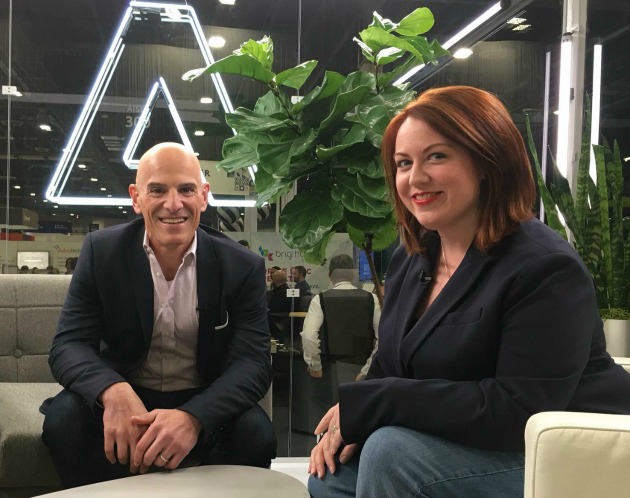Startup marketing presents some challenges different from those of enterprise marketing (although they do have commonalities). But whether you're a brand new business or a centuries-old conglomerate, one aspect of your business is of paramount importance: customer experience (CX).
Don't miss a MarketingProfs podcast, subscribe to our free newsletter!
David Cooperstein's consultancy, Figurr, specializes in helping new businesses to find their story and create a marketing strategy. His appreciation for CX began when he led the CMO research practice at Forrester Research.
"Seeing customer success people and account people reporting on their communication with customers, I noticed how all those interactions rolled up into a customer's impression of the company," David said. "Customer calls for service, sales... you need to think about the company holistically."
I met David in March at the Adobe Summit in Las Vegas (pic below), and invited him to Marketing Smarts to talk about startup marketing, CX, and engineering experiences that align with how you want your company perceived in the marketplace.
Here are just a few highlights from our conversation:
Everyone at your company is your brand (02:52): "There's a need for everybody to understand that they are complicit in how the company presents itself. That includes the people who are outside in front of the corporate office, people who are at the point-of-sale terminal, people who are just wearing a logo while they're walking around San Francisco (which you know everybody does). They all have to think about what that means to be wearing the company logo or being an ambassador for the brand. When it comes to customer experience, if you just let people be whoever they want to be, that better be part of your brand. Because people are going to represent themselves in a way that people will think, 'Oh, that's the company's attitude, not just the person's attitude.'
"This was more familiar back in the 1950s when everybody would just toe the line of a brand. But there were fewer people that had access to customers back then. Now, all it takes is some social media and all of a sudden your customers are being affronted by someone who's a brand ambassador and not realizing that they have maybe a very different point of view."
Startup marketers face different challenges than their their counterparts at big companies (10:12): "There's way less process (at startups), and I mean that in both good and bad ways. For startups, there's less process because there's less history. There's also fewer people. It's more freeing because you can be really creative. On the flip side, not everybody wants to conform to whatever you come up with unless the CEO says 'this is the way we're going to do it.' Usually, resources are constrained for making the marketing effort get the reach that it needs.
"On the enterprise side, you've got way more process than you do creativity because you're trying to appeal to so many different factions and the company already has a message in the marketplace that, for whatever reason, they're just trying to update. There are both challenges in coming up with that idea because it has to appeal to all the right factions—board of directors, employees, sales teams, customers—but there's also a huge process to get it out the door to global locations and different divisions and just the sheer cost of reformatting everything for a new brand or new concept around marketing. It involves a lot more training, so it takes a lot longer just to get the effort out the door."
Focus on the customer, not just your product or your sales numbers (12:01): "The key is having a customer experience mindset. Some startups are so product-focused or sales-focused that they don't think about the implications of everybody being part of that customer experience. There's an interest, if the company understands that they need to be customer-focused, to give an experience that crosses all those boundaries. But sometimes you hire somebody who just has their way of doing things, and before you know it they've come up with a whole idea for how they approach customer success or even accounts payable.... It's not easy for people with the professional background to take the risk. They may just try to do things the way they're comfortable doing.
"You also get a lot of renegades in startups (that's why they're not in big companies), and they may say, 'That's really interesting, but I'm going to do it my way.' Those people don't usually last long in startups, but they do exist, and you have to be prepared for them. Sometimes their way is better and you want to find a way to feed that back into the company. With either side, there are things you need to just watch out for, and if you see somebody going rogue on things, determine whether that rogue is a good rogue or a bad rogue, and figure out what to do about it."
Maintaining a focus on customer experience can help you with product research and development (21:00): "There's always got to be a vision way bigger than what the product is going to deliver on Day One, and then you work your way down from vision to go-to-market strategy. Customers don't really care that much about vision—they want to buy something; but if they know what the vision is, then you can start having a conversation with them (which is part of the customer experience), where you say, 'This is what we're offering today: What else do you need in order to continue to evolve your business?
"That is where you can intersect product development, marketing, and customer experience in one. If the sales orientation is to build relationships with the customer, then there's a feedback loop that is very natural and the customer doesn't mind sharing some of their plans and feedback on what they would like the product to do in its net iteration. That's gold for a product developer."
To learn more, visit Figurr.com or follow David on Twitter: @minicooper.

David and I talked about much more, including the importance of customer experience for retention, so be sure to listen to the entire show, which you can do above, or download the mp3 and listen at your convenience. Of course, you can also subscribe to the Marketing Smarts podcast in iTunes or via RSS and never miss an episode!
This episode brought to you by GoToWebinar:
GoTo Webinar makes it easy to produce engaging online events. Whether you want to connect with your prospects, customers or employees, GoTo Webinar has the tools and analytics you need. Start creating interactive and educational webinars your audience will love.
Music credit: Noam Weinstein.
...sign up for free to continue reading
Don't miss a MarketingProfs podcast, subscribe to our free newsletter!
Published on August 9, 2018







